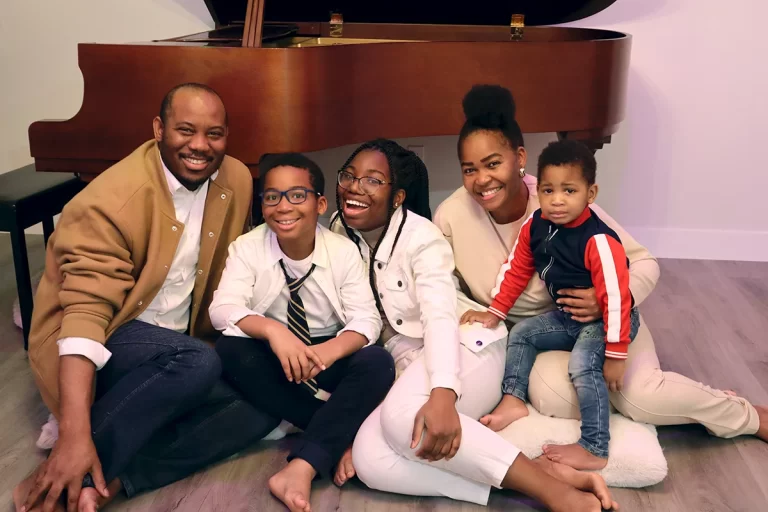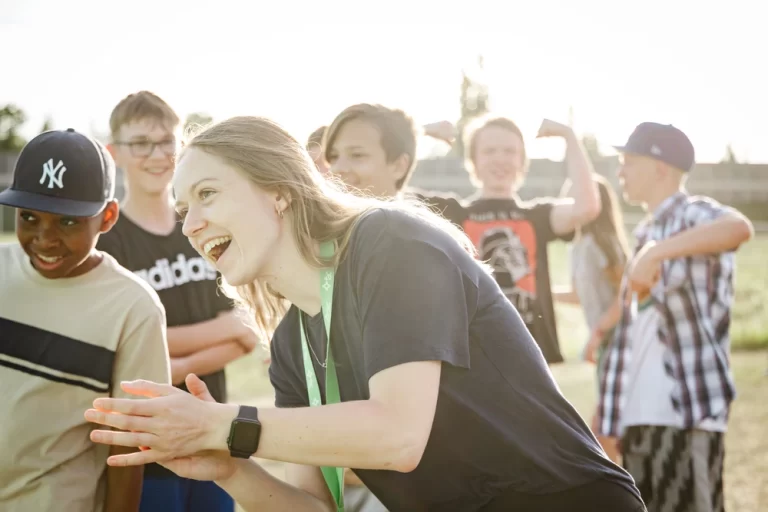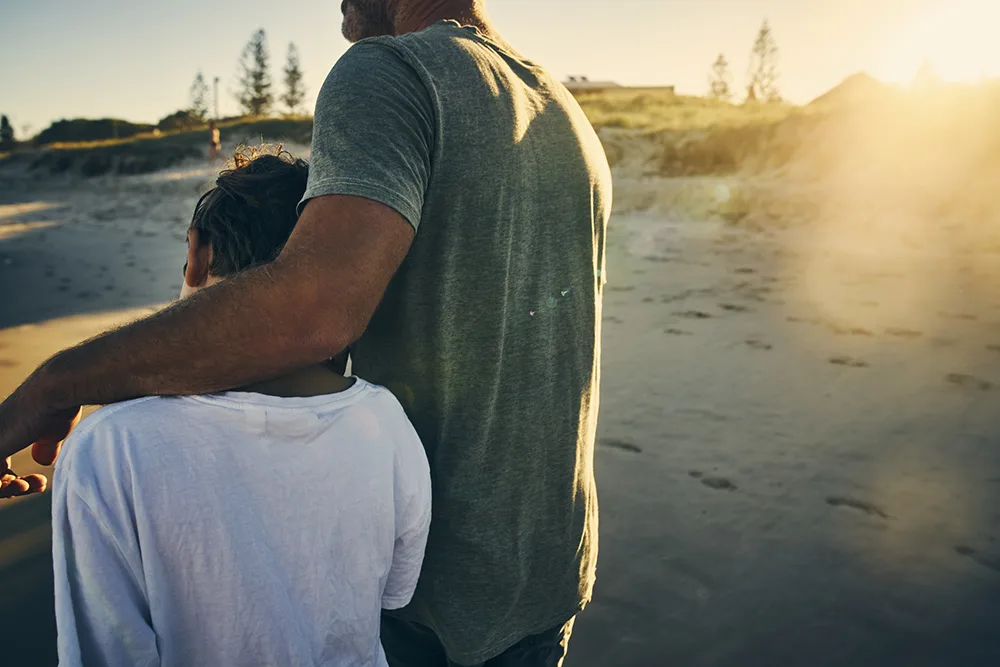
How to Fix Your Family (Hint: You Can’t—But Jesus Can)
For many of us, the desire to “fix” our families runs deep. Maybe your home feels tense, strained, or disconnected. Maybe there’s a long history of wounds, or more silence than conversation. Maybe you feel like a failure as a parent (most of us feel like failures as parents), a spouse, or a child. It’s natural to want to make things right. But here’s the truth: We can’t fix our families. Not on our own. And the good news is, we don’t have to. Because Jesus already made a way.
Where Atonement and Family Life Meet
Why did Jesus have to die? It’s a question I’ve heard from students more times than I can count. And while there are good, biblical answers—the kind you find in Romans 3 or 6, about sin and death and grace, those answers only scratch the surface. Because when someone asks why Jesus died, they’re often asking something deeper. They’re really asking, can anything be made right again? Can I be made whole? Can my family be whole?
We don’t always talk about the atonement in that way. We tend to think of it in individual terms: Jesus died for me. He paid my price. He bore my sin. And that’s gloriously true—but it’s also incomplete. The cross isn’t just personal, it’s relational. The atonement isn’t just about wiping our individual slates clean. It’s about making a way for entire communities, households, and yes, even families, to be restored.
To understand how the atonement applies to our families, we need to go back. Not just to the cross, not just to the sacrificial system way back in the Pentateuch (the first 5 books in the Old Testament) … we have to look even farther back… back beyond even the first Passover before the Israelites escaped Egypt. To understand how atonement applies to our families, we need to go all the way back to the beginning. In Genesis 3, Adam and Eve sin. They hide in shame. Their perfect relationship with God and with each other is broken. How does God respond? He doesn’t lash out in rage. He doesn’t ignore them. Instead, He covers them.
Genesis 3:21 tells us: “The Lord God made garments of skin for Adam and his wife and clothed them.” It’s easy to miss the weight of that moment. In order to make those garments, God would have had to kill an animal. This is the very first death in Scripture. The first time blood is shed. The first time an innocent dies to cover the guilty. That act becomes the foundation for what we later call the sacrificial system. It’s the beginning of substitutionary atonement.
And it starts in a family.
From that point on, the pattern is set: Sin damages, but sacrifice restores. God allows animal sacrifices to serve as a temporary covering for human sin, culminating in events like the Day of Atonement or the blood on the doorposts in Exodus. But all of these rituals are pointing to something greater. They’re shadows of the cross. They’re echoes of Eden. They’re building toward the moment when God Himself will provide the final sacrifice, not an animal, but His one and only Son.
When Jesus dies on the cross, He does so in our place. He becomes the substitute. His blood covers our sin. The curtain is torn. The chasm between God and humanity is bridged. That healing power doesn’t stop with us as individuals; it radiates outward into every area of our lives, including our relationships at home.
When I showed up in Calgary in 2019, I was a broken man. In my own eyes, and probably in the eyes of the world, I was a complete failure. I was a former pastor, a former married man, a former homeowner, and now I was struggling to pay the bills. Life had unravelled. My youngest was 13 when their mother walked out on us, and I became a single dad.
In the fall of 2018, I took a job running a summer camp northwest of Cochrane. It had taken me years of counselling, mentoring and mountains of personal self-work to get to the place where I was willing to step back into ministry and yet… I was still so broken, so ashamed, so humbled, and so ready to discount the person that I was and the person I had been. I saw everything in my rear-view mirror and couldn’t see much beyond the next horizon. In the Fall of 2019, with my now-grown, adult kids staying behind in Edmonton, I packed up everything I owned into a tiny U-Haul and moved with my sad dog into an apartment I could afford to rent in Northeast Calgary.
I knew I needed a church home, so I started attending First Alliance Church and began volunteering in the youth ministry. That’s where I met Melissa. We were both youth leader coaches and started connecting over ways to support our leaders and the students. Then COVID hit, and as the world slowed down, we began spending more time together.
Can I be honest? I hadn’t dated since the 90s. My previous relationship had left me shell-shocked, and I had zero intention of ever getting married again. So when Melissa and I started hanging out, we were just friends. Good friends, great friends, even. But, like it often happens when a guy and a girl start spending time together during a global pandemic … my cold and frozen heart began to melt in ways I didn’t expect.
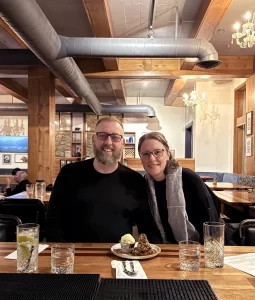 We met in January of 2020, and by July, we were officially dating. On one of our early dates, we were walking through Nose Hill Park when she started asking me some deep questions… questions about dreams, hopes, and my past. Each one seemed to poke at some buried insecurity, some way I felt I had let myself down. She had no idea the depths of shame she had uncovered with those simple questions. At one point, she asked why I had never pursued a master’s degree, since it was clear it had always been on my mind. I told her I just didn’t think I was smart enough. But she believed I was.
We met in January of 2020, and by July, we were officially dating. On one of our early dates, we were walking through Nose Hill Park when she started asking me some deep questions… questions about dreams, hopes, and my past. Each one seemed to poke at some buried insecurity, some way I felt I had let myself down. She had no idea the depths of shame she had uncovered with those simple questions. At one point, she asked why I had never pursued a master’s degree, since it was clear it had always been on my mind. I told her I just didn’t think I was smart enough. But she believed I was.
And… for the first time in my life, it seemed… someone close to me believed in me.
That night, after our date, I went home and applied for my master’s degree. That fall, I started the Master of Leadership in Ministry program at Ambrose University. And on May 12, 2025, I walked across the stage to accept my degree.
Melissa believed in me so much, she was willing to marry me. And it was her belief in what God could still do through me that gave me the courage to apply for the Student Ministries Team Lead here at First Alliance Church. Now, 4 years later, I serve as the Family Life Pastor—overseeing DiscoveryLand, Youth, Young Adults, Couples, and Seniors’ ministries. This fall, I will celebrate 25 years in ministry.
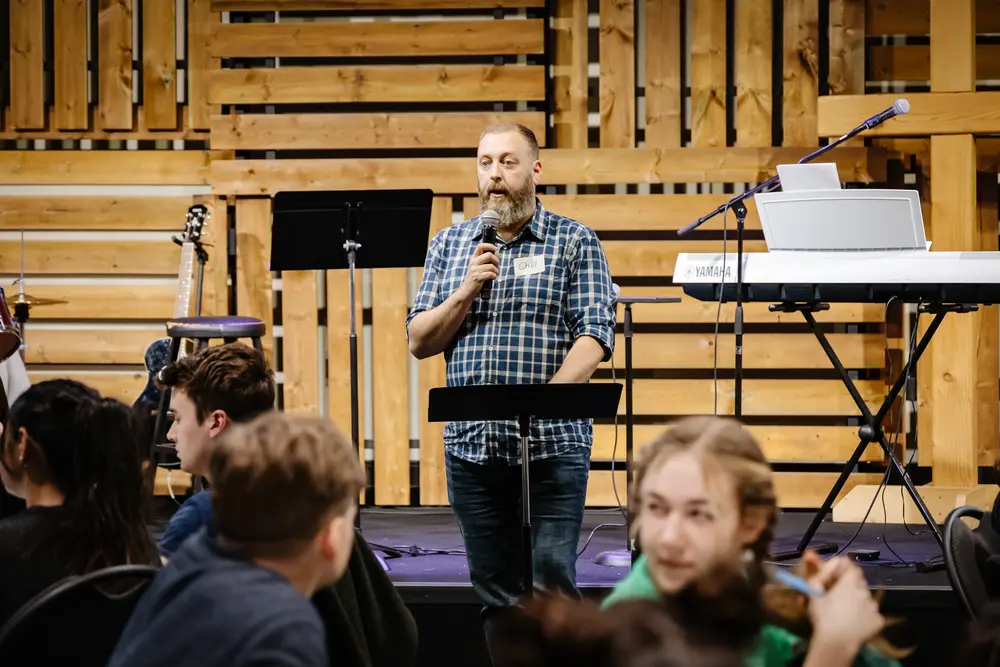
Melissa believed God wasn’t finished with me. And because of her, I started to believe that, too. She helped me to bring my shame, my pain and my story into the light, where God could do his healing work in my heart so that I could be the man I needed to be for this new relationship that had already made such an impact on me.
Back to the Atonement
The atonement changes the way we live with one another. It reminds us that healing isn’t something we manufacture. Reconciliation isn’t something we earn. Wholeness isn’t something we force. These things come from Jesus. Only Jesus.
And so, if your family is hurting, take heart. You don’t need to carry the weight of fixing it all. You don’t have to pretend everything’s okay. What you need is to bring your family, your struggles, your failures, your hopes, your stories, into the light of the cross. Let Jesus carry what you cannot. Let His grace break cycles you’ve tried for years to end. Let His mercy speak into conversations you’ve been too afraid to have.
Because Jesus didn’t just die to rescue your soul. He died to redeem your relationships. He died so that your family could know peace, forgiveness, and new beginnings.
So no, you can’t fix your family. But Jesus can. And because of the atonement, there is always a way forward.
Written by Chet Kennedy, Family Life Pastor at FAC
You may also be interested in …


